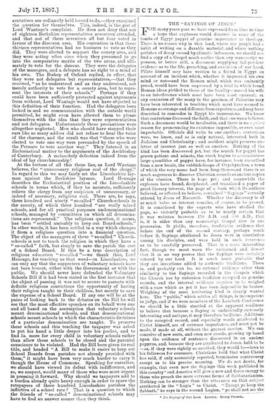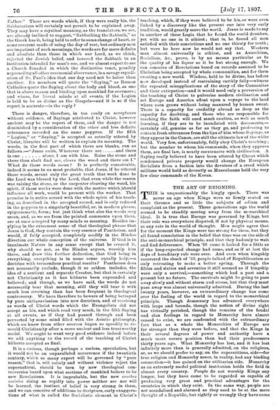THE "SAYINGS OF JESUS."
FOR many years past we have expressed from time to time a hope that explorers would discover in some of the tombs of Egypt papyri of genuine importance to theology. There is no reason why in that land, where the people had a habit of writing on a durable material, and where nothing perishes of decay caused by climatic influences, we should not find a copy of a Gospel much earlier than any manuscript we possess, or better still, a document supplying independent evidence as to the life, preaching, and execution of our Lord. Pilate himself may have written to a friend in Egypt an account of an incident which, whether it impressed his own mind or not—and the Roman mind, which was eminently proud, would have been impressed by a trial in which broad Roman ideas yielded to those of the locality—moved his wife to an interference which must have been most unusual; of any centurion of the many in the garrison of Palestine may have been interested in teaching which must have seemed to Romans so strange and different from experience, and may have described to comrades in Egypt his impressions. We know that centurions discussed the faith, and that one was a believer. Such a document would be invaluable, and there is no a priori reason for pronouncing its existence impossible, or even most improbable. Officials did write to one another ; centurions were, we know, and as is only natural, interested both in Judaism and Christianity ; and accident might preserve one letter of interest just as well as another. Nothing of the kind has been discovered yet, but the search for papyri has grown patient and minute, the stock begins to accumulate— large quantities of papyri have, for instance, been unearthed from a new locale, the rubbish-heaps of Oxyrbynchus, a town of which the very name had been forgotten—and there is as much eagerness to discover Christian records as ancient copies of the classics. There is hope yet ; and meanwhile the explorers have found, deciphered, and translated a paper of great literary interest, the page of a book which its authors believed, or affected to believe, contained Sayings" actually uttered by Jesus of Nazareth. Whether the discovery is of as much value as interest remains, of course, to be proved. It is considered by the experts who have studied the page, so violently probable as to be nearly certain that it was writtten between 150 A.D. and 300 A.D., that is, it is older than any manuscript Gospel now in our possession. It yields, therefore, irrefutable evidence that before the end of the second century, perhaps much before it, Sayings attributed to Jesus were in circulation among his disciples, and were held in such reverence as to be carefully preserved. That is a most interesting fact, though we must warn the unlearned and devout that it in no way proves that the Sayings were certainly uttered by our Lord. It is much more probable that they are inventions added to authentic traditions. There is, and probably can be, no external evidence other than similarity to the Sayings recorded in the Gospels which the Church has by unbroken tradition accepted as genuine records, and the internal evidence requires to be weighed with a care which as yet it has been impossible to bestow. Weighing of the most hesitating kind is clearly wanted here. The "public," which settles all things, is incompetent to judge, and if we were members of the Lambeth Conference we should be a little startled at the apparent readiness to believe that because a Saying is undoubtedly extremely interesting and antique, it may therefore be divine. Additions to the accepted record, and especially words attributed to Christ himself, are of extreme importance, and must not be made, if made at all, without the gravest caution. We can conceive of new sects, and even new creeds, growing up based upon the evidence of sentences discovered in an ancient papyrus, and, because they are attributed to Jesus, held to be —as, if they were rightly so ascribed, they would be—laws to his followers for evermore. Christians hold that what Christ has said, if only accurately reported, terminates controversy except as to his precise meaning. We do not doubt, for example, that even now the Sayings this week published in this country* and America will give a new and fierce energy to those who preach the more extreme forms of Sabbatarianism. Nothing can be stronger than the utterance on that subject attributed in the " Logia " to Christ. "Except ye keep the Sabbath," he says in the second Logion, " ye shall not see the • The Sayisus of Our Lord. London: Henry Frowde. Father." Those are words which, if they were really his, the Sabbatarians will certainly not permit to be explained away. They may have a mystical meaning, as the translators, we see, are already inclined to suggest, " Sabbathing the Sabbath," as the Greek has it, being held to refer to some change of heart, or some reverent mode of using the day of rest; but ordinary men are impatient of such meanings, the words are far more definite and absolute than those in which our Lord, as we think, rejected the Jewish belief, and lowered the Sabbath to an institution intended for man's use, and we almost expect to see a Church founded in which the distinctive tenet, possibly superseding all other ceremonial observance, is a savage repudi- ation of St. Paul's idea that one day need not be holier than another. Its members will quote the "Saying," as Roman Catholics quote the Saying about the body and blood, as one that is above reason and binding upon mankind for evermore ; and where, for literal minds at all events, if the Logion is held to be as divine as the Gospels—and it is so if the report is accurate—is the reply ?
There is danger, therefore, in too ready an acceptance without evidence, of Sayings attributed to Christ, however ancient may be the report of them, and the danger is not diminished by a consideration of the other and less definite utterances recorded on the same papyrus. If the fifth " Logion," or "Saying," is accepted as actually uttered by Christ, libraries will be written to explain its meaning. The words, in the first part of which there are blanks, run as follows :—" Jesus saith, Wherever there are and there is one alone, I am with him. Raise the stone and
there thou shalt find me, cleave the wood and there am I." What do those words mean ? It is perfectly conceivable, indeed it seems to us most probable, that Jesus, if he uttered those words, meant only the great truth that work done to the Lord was blessed by the Lord, that even while the mason was raising the stone, or the carpenter cleaving the wood, his spirit, if those works were done with the motive which:should influence all work, would be present with the worker. That promise is in entire accord with the whole spirit of his teach- ing, as described in tin accepted record, and is only reduced in the papyrus to a singularly beautiful, or, in modern phrase, epigrammatic, form ; but just think what also the words may mean, and, as we see from the printed comments upon them, are at once accepted by many minds as meaning. Besides im- plying in the extremest sense of that theological phrase that Jesus is God, they contain the very essence of Pantheism, and would, if fully accepted, completely modify in the Hindoo direction our whole conception of the universe. If God is in inanimate Nature in any sense except that he created it, why should we not, as the Hindoo argues, worship him there, and draw this further deduction, that God being in everything, everything is in some sense equally holy,—a doctrine with tremendous practical results? Pantheism does not necessarily exclude, though it so seldom includes, the idea of a sentient and separate Creator, but that is certainly not Christianity as it has hitherto been expounded and believed ; and though, as we have said, the words do not necessarily bear that meaning, still they will bear it with much less straining than has been frequent in theological controversy. We have therefore to beware of being betrayed by pure antiquarianism into new doctrines, and of receiving as words of Christ words which the Evangelists did not accept as hie, and which read very much, in the fifth Saying at all events, as if they had passed through and been perverted by some mind filled with the Asiatic philosophy, which we know from other sources began so speedily to re- mould Christianity after a more ancient and less trustworthy model. We ought to want very good evidence indeed before we add anything to the record of the teaching of Christ hitherto accepted as final.
It is a curious, though perhaps a useless, speculation, but it would not be an unparalleled occurrence if the twentieth century, which so many expect will be governed by " pure reason," that is, will calmly and without violence reject the supernatural, should be torn by new theological con- troversies based upon what sections of mankind believe to be new Revelations. It is improbable, but the new couches sociales rising so rapidly into power neither are nor will be learned, the instinct of belief is very strong in them, and we can conceive of additions to Scripture, early exaggera- tions of what is called the Socialistic element in Christ's teaching, which, if they were believed to be his, or were even linked by a discovery like the present one into very early tradition, would greatly move the world. Jesus is made to say in another of these Logia that he found the world drunken, yet with no one in it athirst; that is, he found all men satisfied with their convictions and no one thirsty for truth ; but were he here now he would not say that. Western man almost universally is athirst, and as Anarchism, Socialism, &c., prove, is by no means particular as to the quality of his liquor so it be but strong enough. We can conceive of Revelations based on records assumed to be ,Christian being accepted by whole communities, and for them creating a new world. Wisdom, held to be divine, has before now developed instead of restraining earthly folly—witness the repeated misapplications of the story of the Canaanites and their extirpation—and it would need only a perversion of the teaching of Christ to pulverise modern civilisation and set Europe and America afloat upon a voyage to the land where corn grows without being manured by human sweat. There is a capacity for credulity abroad as deep as the capacity for doubting, and those who are responsible for teaching the faith will need much caution, as well as much learning, if they are to be inundated with documents,— certainly old, genuine as far as they go, and professing to contain fresh utterances from the lips of him whose Saying', as they appear in the Canon, are still the ultimate law of the white world. Very few, unfortunately, fully obey Christ's teaching ; but the number to whom his commands, when they approve them, are final law, is nearly coextensive with civilisation. A Saying really believed to have been uttered by Christ which condemned private property would change the European Socialists from a faction into the devotees of a creed which millions would hold as devoutly as Mussulmans hold the very few clear commands of the Koran.



































 Previous page
Previous page